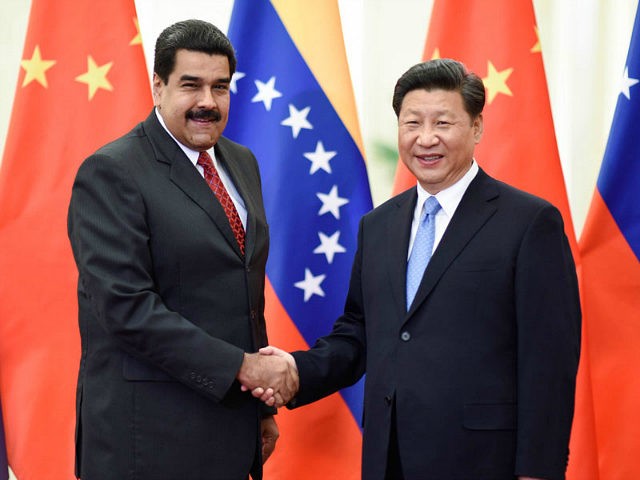The communist government of China, which has poured billions into the country, did not congratulate Venezuelan dictator Nicolás Maduro on the completion of a presidential election widely considered fraudulent in the free world, instead referring to the election as a domestic matter on Monday.
The South China Morning Post, which caught Foreign Ministry spokesman Lu Kang’s tepid reaction to the Venezuela situation, notes that China has been a reliable ally of the socialist chavista regime for years, but has slowly begun distancing itself from Maduro as he has failed to control the calamitous state of the Venezuelan economy. Under Maduro, Venezuela has taken out billions in Chinese loans but failed to begin paying them back, prompting at least one lawsuit so far by a Chinese company demanding payment from Petróleos de Venezuela (PDVSA), the state oil company.
Maduro banned opposition candidates from running against him in the May 20 election, and “won” re-election against a handful of leftist candidates with what even official estimates show to be the lowest turnout in modern Venezuelan election history.
“Regarding the election in Venezuela, China has followed the principle of non-interference in others’ internal affairs as always, and we believe the Venezuelan government and people are capable of handling their domestic affairs,” spokesman Lu said on Monday.
Asked if China would congratulate Maduro specifically, Lu said, “China will handle that in accordance with its diplomatic practice,” without elaborating.
On Tuesday, Lu refused to issue a statement on the legitimacy of the Venezuelan election yet again, this time asked about a new round of sanctions the United States placed on the Maduro regime in response to the event. “The latest general election is Venezuela’s internal affairs. A fundamental principle of China’s foreign policy is non-interference in others’ domestic affairs,” he reiterated. He refused to answer whether he believes the United States will pressure China on its loans with Venezuela, instead stating, “I don’t think others should interfere in China’s normal relations with countries around the globe, including in normal cooperation.”
Xinhua, one of China’s many state news agencies, published a story with a slightly more open endorsement of the fradulent vote, citing a Bolivarian socialist “expert” who claimed “The election will strengthen democracy and people’s confidence in Venezuelan state institutions.”
“When Maduro was first elected president in April 2013, Beijing sent its congratulations within hours of his victory, while President Xi Jinping later sent a personal note expressing his best wishes,” the Morning Post reports, noting the difference in tenor between the two responses. The newspaper notes that, despite any freeze that may be developing in the relationship, China has poured over $50 billion into Venezuela since the era of late socialist dictator Hugo Chávez, who chose Maduro as his hand-picked successor despite his lack of popularity with Venezuelan people.
Chinese officials have for years touted Latin America as a lucrative venue for Chinese investment. Latin America is a key part of the plan known as “One Belt, One Road,” which Xi Jinping hopes to implement to place Chinese workers around the world to build infrastructure – ports, harbors, and roads – that China can later use to control the region, either by controlling the infrastructure or forcing the nations purchasing it into such deep debt that China essentially owns them.
With Venezuela, that debt may have gotten too big.
“For a long time, Venezuela has been a hot investment destination in South America for Chinese firms. The country’s economy and social unrest exposes China’s commercial interests to huge risks,” China’s state-run Global Times warned in August 2017. “If a civil war really breaks out in Venezuela, then those Chinese business interests will be gone.” Continued investment in Venezuela “may impact China severely,” the outlet warned.
By then, however, investment had waned. The Chinese government’s latest massive loan to Venezuela came in 2015, when Maduro personally visited Beijing asking for money. China has since refused to help Venezuela ease its debt burden, instead stating in November, “we believe that Venezuela’s government and people have the ability to properly handle their debt issue.”
A month later, the Chinese company Sinotec sued PDVSA for $23.7 million plus interest and damages after failing to receive loan repayments.

COMMENTS
Please let us know if you're having issues with commenting.